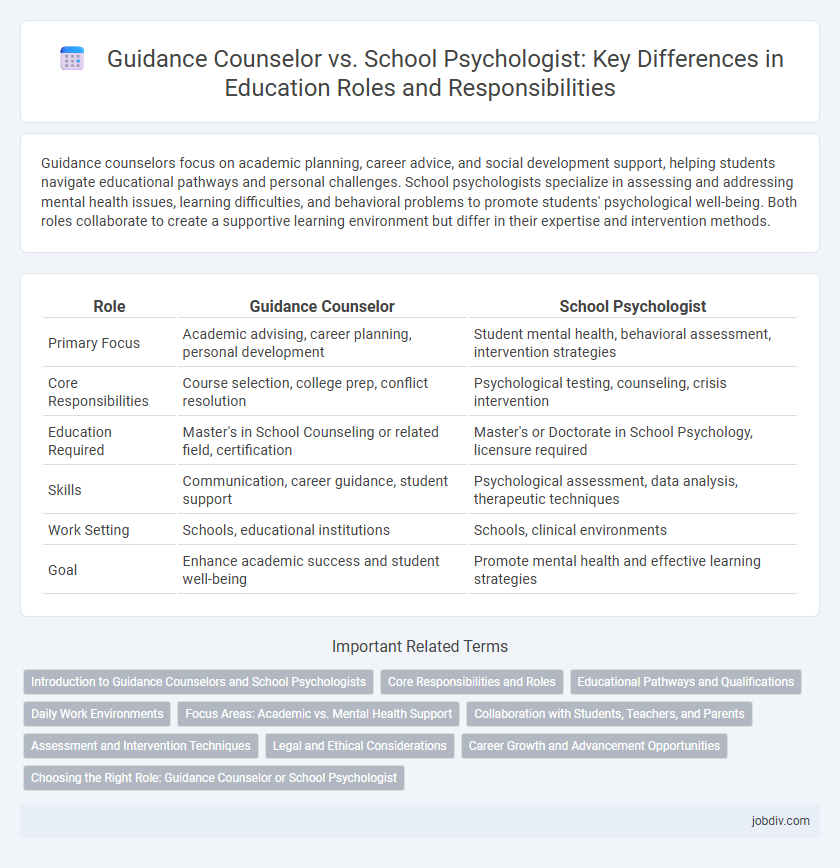Guidance counselors focus on academic planning, career advice, and social development support, helping students navigate educational pathways and personal challenges. School psychologists specialize in assessing and addressing mental health issues, learning difficulties, and behavioral problems to promote students' psychological well-being. Both roles collaborate to create a supportive learning environment but differ in their expertise and intervention methods.
Table of Comparison
| Role | Guidance Counselor | School Psychologist |
|---|---|---|
| Primary Focus | Academic advising, career planning, personal development | Student mental health, behavioral assessment, intervention strategies |
| Core Responsibilities | Course selection, college prep, conflict resolution | Psychological testing, counseling, crisis intervention |
| Education Required | Master's in School Counseling or related field, certification | Master's or Doctorate in School Psychology, licensure required |
| Skills | Communication, career guidance, student support | Psychological assessment, data analysis, therapeutic techniques |
| Work Setting | Schools, educational institutions | Schools, clinical environments |
| Goal | Enhance academic success and student well-being | Promote mental health and effective learning strategies |
Introduction to Guidance Counselors and School Psychologists
Guidance counselors specialize in academic planning, career development, and personal/social support for students, aiming to foster overall student success. School psychologists focus on assessing, diagnosing, and addressing learning and behavioral challenges through evidence-based interventions and psychological testing. Both professionals collaborate to create supportive educational environments, but their roles differ significantly in scope and expertise within the school system.
Core Responsibilities and Roles
Guidance counselors primarily focus on academic planning, career development, and personal/social support to help students achieve educational and life goals. School psychologists specialize in assessing cognitive, emotional, and behavioral functioning to provide interventions, support mental health, and develop individualized education programs (IEPs). Both professionals collaborate with teachers, parents, and administrators to create a supportive learning environment tailored to student needs.
Educational Pathways and Qualifications
Guidance counselors typically hold a master's degree in school counseling or a related field and must obtain state certification or licensure specific to counseling roles in educational settings. School psychologists generally require a specialist degree (Ed.S.) or a doctoral degree (Ph.D. or Psy.D.) in school psychology, along with certification or licensure that meets national standards such as those from the National Association of School Psychologists (NASP). Both professions demand supervised internships or practicum experiences, but school psychologists often undergo more extensive training in psychological assessment and intervention techniques.
Daily Work Environments
Guidance counselors typically work in school offices, interacting directly with students to provide academic advising, college planning, and personal development support. School psychologists often spend time in both classrooms and private consultation rooms, conducting assessments, behavioral interventions, and collaborating with teachers for individualized education plans (IEPs). While guidance counselors focus on broad student guidance, school psychologists emphasize mental health evaluations and specialized support within educational settings.
Focus Areas: Academic vs. Mental Health Support
Guidance counselors primarily focus on academic planning, career advising, and college readiness, helping students navigate course selections and post-secondary options. School psychologists concentrate on mental health support by assessing cognitive, emotional, and behavioral issues, providing interventions for learning disabilities and emotional challenges. Both roles collaborate to create a comprehensive support system addressing students' academic and psychological needs.
Collaboration with Students, Teachers, and Parents
Guidance counselors collaborate with students, teachers, and parents to develop academic plans, address social challenges, and facilitate college and career readiness. School psychologists work closely with these groups to assess student needs, implement behavioral interventions, and provide mental health support. Both professionals form a vital partnership to create a supportive educational environment tailored to student well-being and success.
Assessment and Intervention Techniques
Guidance counselors primarily use academic and career assessments such as interest inventories and aptitude tests to help students with educational planning and personal development. School psychologists employ psychological evaluations including cognitive, behavioral, and emotional assessments to identify learning disabilities and mental health issues. Intervention techniques by school psychologists often involve individualized counseling, behavioral interventions, and crisis management, while guidance counselors focus on group counseling, academic advising, and college readiness programs.
Legal and Ethical Considerations
Guidance counselors and school psychologists operate under distinct legal frameworks, with counselors primarily guided by educational law and school psychologists governed by mental health regulations such as HIPAA and FERPA. Ethical considerations for counselors emphasize confidentiality and student advocacy within academic settings, while psychologists must navigate complex consent, assessment, and intervention protocols to protect student welfare. Both roles require adherence to professional codes such as ASCA Ethical Standards for School Counselors and NASP Principles for Professional Ethics to ensure lawful and ethical practice in educational environments.
Career Growth and Advancement Opportunities
Guidance counselors typically advance by becoming senior counselors, lead counselors, or transitioning into school administration roles such as assistant principals. School psychologists often pursue specialization or certification in areas like neuropsychology, or advance into supervisory roles, research, or university faculty positions. Both careers offer pathways to leadership and greater impact on educational policies and student support services.
Choosing the Right Role: Guidance Counselor or School Psychologist
When choosing the right role between a guidance counselor and a school psychologist, consider that guidance counselors primarily focus on academic planning, career advice, and social development, while school psychologists specialize in diagnosing learning disabilities and addressing mental health issues. Education for guidance counselors typically requires a master's in counseling or education, whereas school psychologists usually need a specialist-level degree (Ed.S.) or doctorate in school psychology. Employers seek guidance counselors to support student success and enrollment strategies, whereas school psychologists provide critical psychological assessments and interventions to foster mental wellness.
Guidance Counselor vs School Psychologist Infographic

 jobdiv.com
jobdiv.com